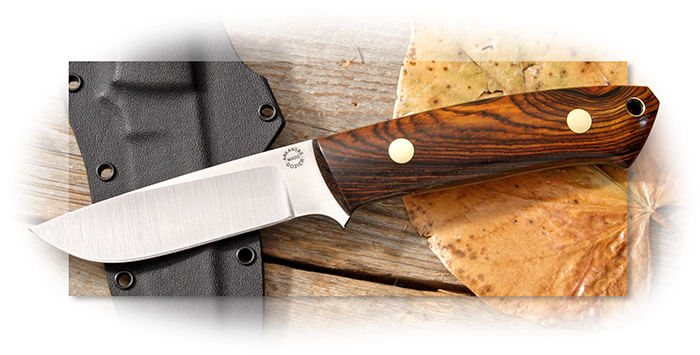Dozier Buffalo River Hunter Cocobolo
Item #: DK-334CO
$285.00
The Dozier Buffalo River Hunter was introduced late in 2005. It is a drop point hunter that was designed for A. G. Russell customers. At the time it was introduced, Desert Ironwood was plentiful. It is a wonderful handle material, but has become increasingly hard to find forcing Bob to look for other suitable handle material. He has found a source of Cocobolo that has as much striking contrast in grain, perhaps more, as the finest Desert Ironwood. Like all of Bob's standard hollow ground hunting knives, these are hand ground in Bob's shop on grinders designed and built by him.
The blade shape is one of the best drop point designs I have ever seen. It is long enough to be a general hunting and camping knife with enough belly to make a good skinning knife but enough straight for splitting kindling and making fuzz sticks. There is no such thing as a knife that will do everything, but this one comes as close as you can get in a hunting knife. The blade measures 3-3/4" long and 15/16" wide of D-2 tool steel with Bob's personal fantastic edge holding heat-treat (60-61 Rc.), possibly the sharpest and best edge holding knife in the knife world today. Measures 8-3/16" tip to butt and weighs 4.9 oz. with Micarta® handle and 4.5 oz. with Cocobolo. Includes a Kydex® sheath of Bob's own design and made in his shop. As great a value in a handmade hunting knife as you can find. We attempt to keep Dozier knives that we include in our catalog on our shelves. They are so popular that we often run out.
If a Dozier knife is not in stock when you order, delivery typically takes 3 to 4 months.
-
TypeFixed
-
BladeDrop Point
-
Blade Length3-3/4″
-
Blade SteelD-2
-
Rockwell60-61
-
HandleCocobolo
-
TangFull
-
Overall Length8-3/16″
-
Weight4.9 oz
-
SheathKydex
-
OriginUSA
Arkansas Made Dozier
Bob Dozier made his first knives when he was only twelve or thirteen years old. He told me the other day that after those few knives, he did not make another until he was about twenty-three and working as a rough neck in the oil fields in Louisiana. He talked about that first simple knife and then told a story about a co-worker asking to come to watch him make knives. Bob had made several knives by then and had created a small rough shop. He said the man stayed and watched until the knife was finished which took most of the day. When it was finished, he asked to look at it. After handling it for a while, he asked Bob how much he wanted for it. Without giving it any thought, Bob says he said $12.50. The man pulled out twelve one dollar bills and two quarters, laid them on the bench, got in his truck and left. Bob went in the house and told his wife he had just sold a knife which took him most of the day to make for $12.50. But, he told me, at that moment he knew he was going to be a knifemaker. That was about 1963.
If you had the opportunity to look through Bob’s collection of his old knives, you would find that he has made many different kinds of knives; hunters, Bowies and fighters, and more recently folders. You can definitely see a relationship between a pair of fighting knives he made in those early years and the practical, utilitarian fighters that began to appear from handmade knifemakers and knife manufactures from the late 1960s and became tremendously popular during the Viet Nam War era. These knives used to be called fighting knives. Today they are called Tactical Knives.

